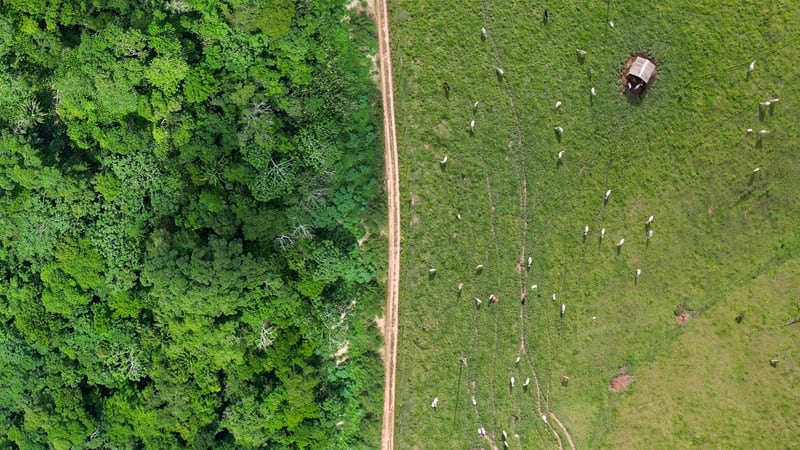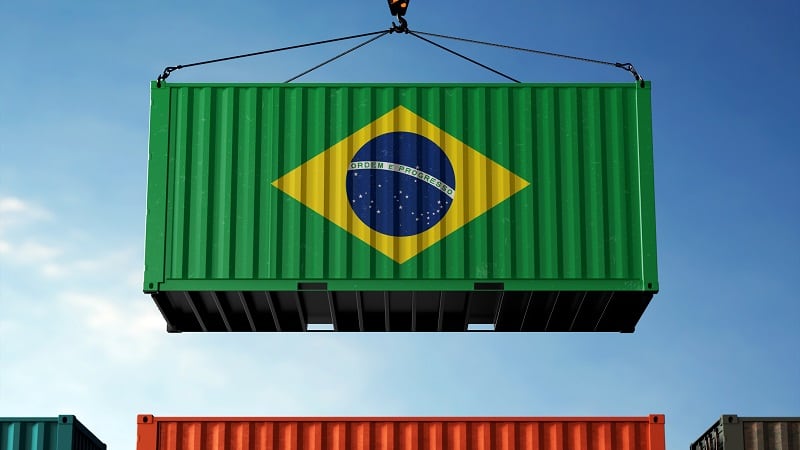Sustainability and agrifood delegates are gathering at the 2025 United Nations Climate Change Conference (COP30) in Belém, Brazil, to discuss creating a more sustainable food system. However, some are raising concerns that major meat producers in the country are not doing enough to reduce their environmental impact.
A week before COP30, non-profit environmental advocacy group the Changing Markets Foundation released a report titled The Meat Agenda: Agricultural Exceptionalism and Greenwash in Brazil, detailing alleged greenwashing activity by Brazil’s meat industry and major companies, like JBS Foods, Marfrig, and Minerva.
The foundation argued that major Brazilian meat industry players are partaking in greenwashing and marketing campaigns to obfuscate their environmental impact, while maintaining “a privileged position of lenient regulation and enormous tax breaks.”
Changing Markets Foundation highlighted sponsorships at industry trade events and corporate sponsorship of the AgriZone at COP30 as evidence of greenwashing. The AgriZone is hosted by the Brazilian Agricultural Research Corporation (Embrapa) and sponsored by industry stakeholders Bayer and Nestlé and non-profits, like the Gates Foundation.
Additionally, the report details a series of alleged human rights and environmental abuses from companies, including “deforestation to exploitative practices, land grabbing, and pollution.”
In 2023, the Brazilian government sought millions from JBS over the alleged sourcing of cattle from deforested parts of the Amazon, according to the New York Times reporting. Additionally, Marfrig faced allegations of human rights violations and similar sourcing concerns, per a letter from 200 Brazilian and international organisations to the Inter-American Development Bank.
“The science is very clear on the impact of meat and dairy and agricultural emissions more generally, but meat and dairy are the dominant driver of that, that even if we cut fossil fuel use emissions from the food systems will still push us past 1.5 degrees,” Madeleine Haughton-Boakes, senior campaigner at Changing Markets Foundation and one of the contributors of the report, elaborated.
She added, “The food system plays a massive role in driving climate change. And I think what a lot of the conversation to date has focused on is pinpointing that in relation to farmers. And that is absolutely not what we are saying. And actually, the majority of these emissions sit in the supply chains of a select few big meat and dairy companies.”
Are Brazilian meat producers investing in sustainability or marketing?
However, over the years, major Brazilian meat producers have made investments in sustainability efforts and tools to help ranchers. For instance, JBS Foods invested $7 million in animal health monitoring technology for ranchers in the Brazilian state of Pará.
JBS made the investment to ensure that the company was not “implicated or involved in illegal deforestation activities or other natural resource conservation or social concerns,” Jason Weller, global chief sustainability officer at JBS Foods, shared in an AgTechNavigator article.
Agriculture’s role in methane emissions
Agriculture is a main contributor of global anthropogenic methane production, accounting for 60% of the 600 million tons generated each year – more than fossil fuels and waste ─ according to the Food and Agriculture Organization of the United Nations.
Some major food and beverage companies are recalibrating their methane reduction strategies. Nestlé faced criticism for exiting the Dairy Methane Action Alliance, an organization that it co-founded, as AgTechNavigator previously reported.
When asked about investments like these, Haughton-Boakes said, “The amount of promotion and comms that goes into sharing those initiatives vastly outweighs the actual benefits that might be reaped from those.”
She added, “JBS, for example, they do not have a methane reduction target, and they do not report on their methane emissions from their Scope 3 [emissions]. If they were really serious about their climate footprint, they would have those because that means that they are transparent and accountable for their emissions.”
Earlier this year, JBS released its 2024 sustainability report and shared progress towards its various 2030 goals, including a target to reduce Scope 1 and 2 emissions by 30% and investing $100 million in research and development to reduce Scope 3 emissions. JBS removed Scope 3 emission reporting from its 2024 reporting, despite reporting them from 2021-2023.
Brazil’s meat industry: An economic opportunity or environmental concern?
Brazil’s agricultural industry is crucial to the country’s economic ambitions, as the country grapples with inflation. Brazil exported a record high of 2.89 million tons of beef in 2024, increasing by 26.2% from the previous year, per Brazilian Association of Beef Exporters data.
Meat production is “a massive part of Brazil’s economic machine,” but “there is still rife inequality,” Haughton-Boakes said.
The Brazilian government has made commitments to sustainability and economic inclusivity, with the Changing Markets Foundation crediting President Luiz Inácio Lula da Silva for “laudable achievements” in reducing deforestation and reducing hunger in the country. However, the non-profit argues that more needs to be done for farmers and the planet.
“The workers are still massively underpaid, and it may not be the best route, especially if Brazil is serious about its climate commitments. ... That is why we really wanted to hold up the policies that have taken place recently to tackle hunger that are more focused on a holistic approach to food systems by supporting smaller farmers and promoting agroecological systems,” she elaborated.
Editor’s Note: AgTechNavigator reached out to JBS, Marfrig, and Minerva for commentary on the report but did not receive responses in time for publication. This article will be updated if and when comments are submitted.





